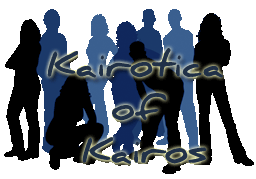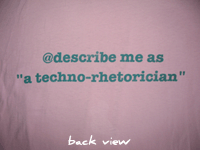

If you've read the Autonomous Technology of Tenure and the Myth of Transparency sections you know that dismantling Kairos's identity has consisted of taking apart the perception of the Internet and the Web, and by association Kairos, as autonomous; deconstructing tenure as a monster of rationality that controls scholarship practices; and dispelling the myth of transparency by encouraging more "in-your-face" designs. Each of these elements influences the construction of Kairos's identity. And Kairos is the journal in which technorhetoricians can publish "in-your-face" scholarship and, thus, break from traditional scholarly interfaces perpetuated by tenure systems. So, to show how Kairos is suited to dismantle the autonomous technology of tenure in this way, we have to explore the two most visible aspects of identity that work to shape Kairos: its name and the people who named it. Because, as Manuel Castells (1997) explains in The Power of Identity, people today, "increasingly organize their meaning not around what they do but on the basis of what they are, or believe they are" (p. 3); it seems appropriate, then, to begin with who the people involved with Kairos are.
@describe me as a technorhetorician
And who are these Kairoi anyway? They are, in most of their own words, technorhetoricians. Tari Fanderclai (1996) mentions it in her book chapter, "like magic, only real" when she describes visiting MediaMOO for the first time during the spring of 1993 when she "wandered into a room called the TechnoRhetorician's Bar and Grill." And the back of the official T-shirt for the 1994 Computers and Writing conference in Missouri read @describe me as a "techno-rhetorician" (see picture below). And most members seem happy to attribute the creation of this term to Eric Crump. In an e-mail I sent to the TechRhet listserv asking about the etymology of this term, Crump (2005) did indeed respond with his definition: a technorhetorician is "simply(?) someone who is aware that for rhetoric, technology is a universal problem (or at least a force to be reckoned with)." Crump commented that in MOO conversations, "using the term technorhetorician was a convenience. It's 'klunky' to say rhetor-who-happens-to-study-the-rhetorical-features-of-technological-environments" (as quoted in Doherty, 2001, p. 111). And, Keith Dorwick (2005) added to the listserv discussion, because they "needed to know what to call [them]selves," an identity was born.
Because Kairos is an online journal devoted to publishing only native hypertexts, there are some parties who will always question its credibility as scholarship. But even more puzzling to me is the automatic assumptions made about the work of technorhetoricians. When announcing that he would take over as editor for Kairos, Greg Siering received "mixed, 'Congrats, but you're crazy' comments from those faculty" -- that is, the "*few* faculty members who "recognized [his] work with Kairos" (personal e-mail). I wonder if they would have made the same comment if he'd announced he was becoming editor of College Composition and Communication or Technical Communication Quarterly, which likely come with release time. In a special multi-online-journal issue about electronic publication, Michael Salvo (2002) tells us that he had to leave his position as managing editor when he realized that he "had to begin making [his] tenure case," which forced him "offline more than [he] would prefer." Contributing to this stress was a former dean who called his online publishing a "youthful indiscretion." Fascination with anything new always seems to be attributed to youth. In the same special issue, George Pullman (2002), JAC Online editor, describes a conversation with an older scholar about a junior scholar's work online: "Yes," the colleague said, "it's interesting stuff. Now if we can just get him to publish something." Given that the world of English studies is committed to the study of language—whatever its form (creative, linguistics, literature, rhetoric, composition, or technical communication)—what is so suspicious about writing scholars who happen to use technology in order to study language and communication?
From an optimistic perspective, some of these comments questioning work with online journals might come from people who understand the commitment and time-consuming processes involved in editing a journal. Therefore, they might be nodding to the enormous work that goes into editorial work generally and even more so when creating web-based publications. These comments might also represent valid concerns about any number of academic situations such as writing the dissertation, understanding the criteria used to evaluate scholarship in most English departments, obtaining a tenure-track position, and securing tenure given the institution's tradition and commitment to print publications. From a more pessimistic perspective, these comments could represent a lack of time to learn new media, a lack of caring about or interest in other disciplines and practices, ego-centrism, small-mindedness, keeping the status quo, and of course, insecurity.
More likely, however, it is as Barry Maid (2000) suggests: Online scholarship appears to have messed up the "nice, neat world of the English department" (p. 12). This mess is the result of various situations, but one that affects tenure decisions and rests on identity; Maid continues, "technorhetoricians are different from their literary colleagues—not only by discipline, but also by job expectations. Technorhetoricians are commonly hired to be more than faculty, resulting in a significant loss of time to perform as faculty" (p. 13). But ultimately, Michael Salvo's explanation demonstrates what is so engaging about technorhetoricians, and also about Kairos staffers specifically: "We were engaging the early grammar of Web-based communication. But we were not programmers, nor were any of us particularly interested in making money. We were interested in the future of communication, in looking at how these new digital tools may or may not impact literacy. And we were trying to offer a place where folks might get a little credit for the work they would be doing anyway, whether or not there was a way to add it to a tenure dossier." I suspect that who they—we—are is more important than who others say we are or should be. And this persona, identity, interface, is what makes Kairos special.
